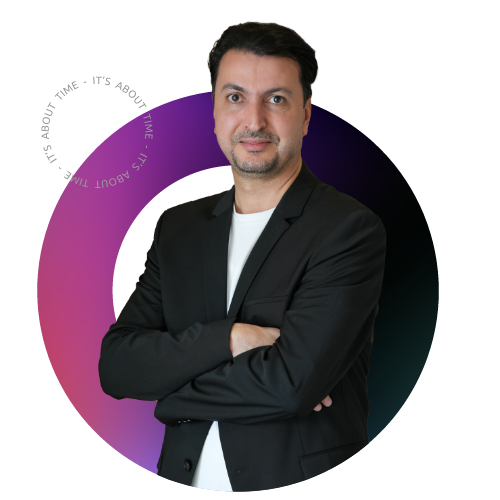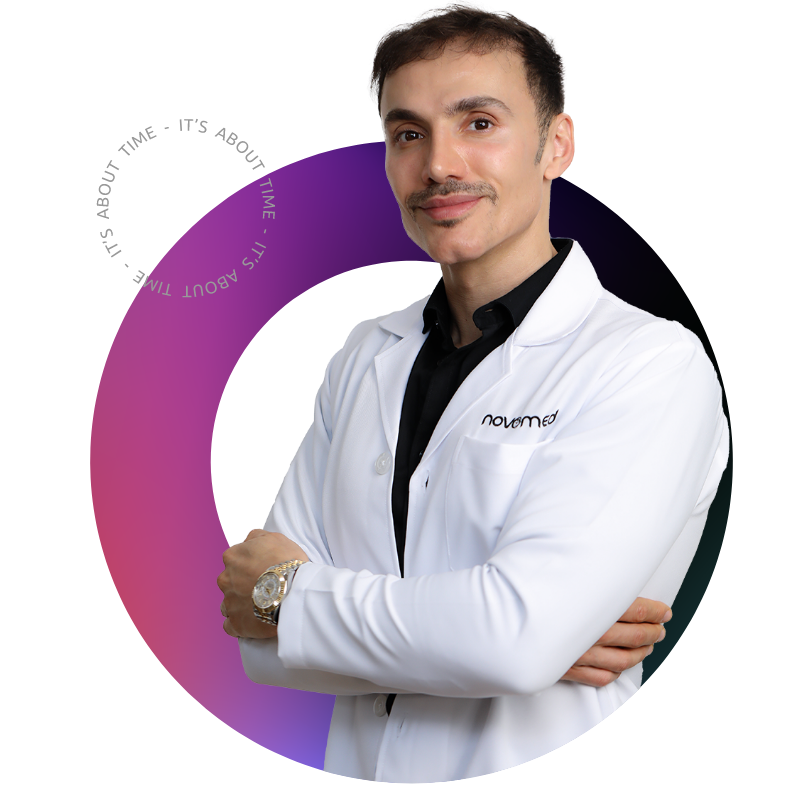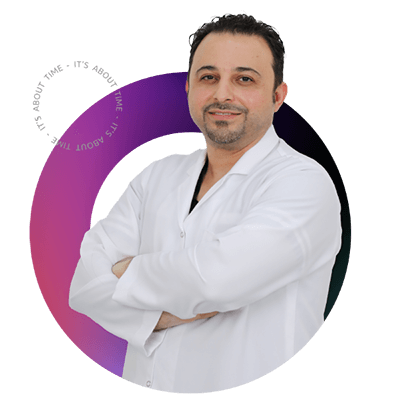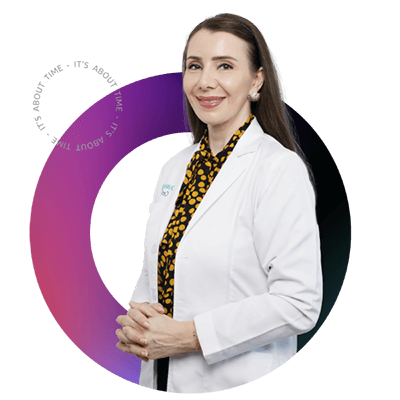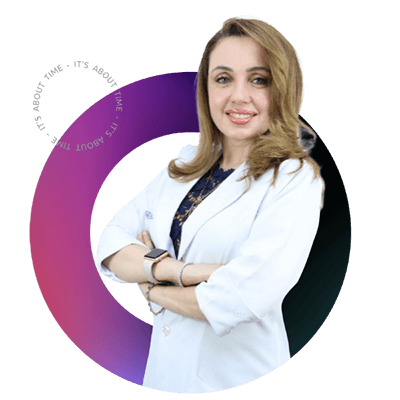A Cold Sore, another name for fever blister, is a small, painful blister or group of blisters that usually appear on or near the lips. They can also appear around your cheeks or nose. These sores are usually caused by herpes simplex virus type 1 (HSV-1), but sometimes they can also be a cause of herpes simplex virus type 2 (HSV-2). Our expert dermatologists in Dubai, Abu Dhabi and Al Ain use advanced screening tests to accurately diagnose skin problems and offer personalized, holistic treatments to eliminate the cause of the problem along with its symptoms.
What are the stages of a cold sore?
Cold sores are also known as fever blisters, oral herpes, and herpes simplex labialis. A cold sore develops in stages, from its appearance to forming blisters and then moving on to healing, usually in 1 to 2 weeks. The stages go through in the following order:
- Tingly or Itching Stage: You may feel tingly, itching, or burning around your lips before the sore appears.
- Blister Stage: Small blisters filled with fluid appear. These can hurt and may leak clear or yellowish fluid after a few days. This stage of leaking is sometimes known as the “weeping stage.”
- Ulcer Stage: The blisters break, leaving sores that are usually painful and cracked open. It might be red and swollen there.
- Scabbing Stage: A yellow crust, or scab, grows over the wound to protect the healing tissue below.
- Stage of Healing: The scab comes off, and the wound heals. The scar eventually disappears, leaving behind a clear skin.
How is a cold sore caused?
Cold sores are caused by the herpes simplex virus type 1 (HSV-1). They start with an initial infection that most people don’t even notice as there may be no symptoms or very mild symptoms, and it can happen in childhood. The virus gets into the body through mucus membranes and settles in nerve ganglia, where it stays dormant or inactive for an extended period until triggered. Stress, illness, hormonal changes, or being out in the sun are some of the triggers that can activate the virus and initiate its attack. It then travels down nerve fibres to the site of the original infection, usually around the mouth. HSV-1 replicates itself in skin cells, which makes painful blisters. When these blisters break, they release highly contagious viral particles that cause cold sores. In the end, the body’s immune system gets rid of the virus, and the wounds heal on their own.
Herpes simplex virus type 2 (HSV-2) is more commonly connected with genital herpes. HSV-2 causes genital herpes and manifests as blisters or sores in the genital and anal regions. However, HSV-2 can occasionally trigger cold sores and oral herpes.
When compared, both types of HSV demonstrate the following factors:
- Herpes simplex virus type 1 (HSV-1) is widely linked to oral herpes, but HSV-2 is far less prevalent. When it does cause oral herpes, it often manifests as painful blisters around the mouth or on the lips, just like HSV-1-induced cold sores.
- HSV-1 favors the mouth and face, while HSV-2 is more common in the genital tract. Nonetheless, HSV-1 and HSV-2 can spread to other body parts.
- Oral transmission of HSV-2 can occur during oral sexual activity with a partner infected with genital herpes caused by HSV-2, as this virus is often spread through sexual contact. Infection of the mouth and face can occur in this way.
Can cold sore be transmitted?
It’s very easy for other people to get cold sores, especially when blisters are present and are highly contagious at this stage of the infection. They can be passed from person to person through kissing, oral sex or by sharing personal things like blankets, razors, cutlery, tools, or lip balm with someone who has them.
What are the symptoms of a cold sore?
The most common symptoms include:
- Itching around the mouth, lips, or nose before the physical appearance of the sore, usually a day or two before the sore reveals
- Swollen area around the mouth, along with an outbreak of tiny blisters
- Pain, discomfort, and a feeling of heat or burning blisters.
- High Temperature/fever
- Sore throat
- Swollen gums
- Pain while swallowing
- Headache
- An upset stomach
How is a Cold sore diagnosed?
A cold sore may usually be diagnosed solely on clinical observation alone, without the need for extensive testing. Some standard diagnostic procedures for a cold sore are as follows:
- Medical practitioners can usually tell if a patient has a cold sore just by looking at the sore.
- The fluid from the blister can be collected on a cotton swab and tested for herpes simplex virus.
- Antibodies to the herpes simplex virus can be detected with a blood test, such as a polymerase chain reaction (PCR) or a serological test, which can be useful in establishing an early diagnosis.
What is the treatment for cold sores?
Herpes labialis, or a cold sore, is treated by easing the pain, speeding up the healing process, and lowering the chance of transmitting the virus to others. The herpes simplex virus can’t be cured, but many over the counter and prescription medicines can help control the symptoms and shorten the length of the outbreak. Some antiviral medications are administered via injection for severe infections. Examples include:
- Acyclovir (Zovirax).
- Valacyclovir (Valtrex).
- Famciclovir.
- Penciclovir (Denavir).
- Cold sore patches
- Lip balms
Cleaning the area with lukewarm water and gentle soap helps soothe the blisters. And then keeping it dry prevents further infections. Do not pick at or pop the blister because this can make it take longer to heal and raise the risk of getting another infection.
What are some of the triggers that can activate the HSV?
Cold sores can be caused by several different things that are unique to each person. Stress, being in the sun, being sick, changes in hormones, and being tired can all cause cold sores to appear. Physical harm and certain foods, like hot or acidic foods, can also be triggers. Getting rid of these factors and taking preventative steps, like using lip balm with sunscreen, learning to relax, and living a healthy life, can help lower the number and intensity of cold sores. Figuring out what causes your cold sores is an important part of managing them and can give you power over how often they happen.
Are Cold Sore and Canker Sore the same diseases?
Canker sores and cold sores are different kinds of mouth sores that look, feel, and are caused differently. The herpes simplex virus (HSV) causes cold sores, which show up on or near the lips. They are common and often come back upon triggers, like stress or being in the sun. They show up as painful blisters filled with fluid. Canker sores, on the other hand, are not caused by viruses and usually show up on soft tissues and mem inside the mouth, like the lips, inner cheeks, or tongue. They don’t spread, have a white or yellowish centre and a red edge. They may be caused by stress, certain foods, or minor injury. Canker sores usually go away on their own in two weeks, but cold sores might need antiviral drugs and skin treatments to be managed.
What are the complications caused by cold sores?
Cases of cold sores are generally not too bad and go away on their own, but sometimes, they can cause complications or other problems. Examples include:
- Secondary Infections
- Eye infections: If HSV-1 gets into the eyes, it can cause herpes keratitis, which can cause pain, redness, trouble seeing, and even lasting scars.
- Spread to other body parts like Fingers, leading to herpes
- Eczema Herpeticum: This is a severe but rare side effect in which the herpes virus moves to other parts of the skin, leaving behind boils and a skin infection that could be serious.
- Psychological and Emotional Effects: Having cold sores repeatedly can upset your self-esteem, especially if they are bad or happen often.
Novomed is committed to giving people with cold sores the best care possible by supporting them with skilled medical experts and cutting-edge treatment choices. Novomed cares about its patients’ health in more ways than just relieving their symptoms, and our focus on long-term control and preventative measures lets our patients get back to their daily lives fit and healthy.
Schedule your appointment at Novomed today!
If you are experiencing signs of a cold sore, book an appointment now with one of our proficient dermatologists in Dubai, Abu Dhabi or Al Ain by calling 8006686, filling out the booking form or clicking the chat icon at the bottom of the screen.
